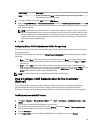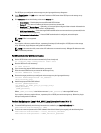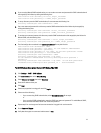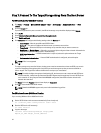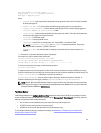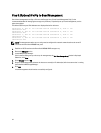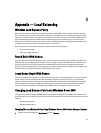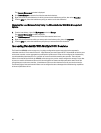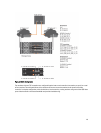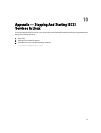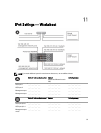9
Appendix — Load Balancing
Windows Load Balance Policy
Multi-path drivers select the I/O path to a virtual disk through a specific RAID controller module. When the multi-path
driver receives a new I/O, the driver tries to find a path to the current RAID controller module that owns the virtual disk.
If that path cannot be found, the multi-path driver migrates the virtual disk ownership to the secondary RAID controller
module. When multiple paths to the RAID controller module that owns the virtual disk exist, you can choose a load
balance policy to determine which path is used to process I/O. Multiple options for setting the load balance policies let
you optimize I/O performance when mixed host interfaces are configured.
You can choose one of the following load balance policies to optimize I/O performance:
• Round robin with subset
• Least queue depth with subset
Round Robin With Subset
The round-robin with subset I/O load balance policy routes I/O requests, in rotation, to each available data path to the
RAID controller module that owns the virtual disks. This policy treats all paths to the RAID controller module that owns
the virtual disk equally for I/O activity. Paths to the secondary RAID controller module are ignored until ownership
changes. The basic assumption for the round-robin policy is that the data paths are equal. With mixed host support, the
data paths may have different bandwidths or different data transfer speeds.
Least Queue Depth With Subset
The least queue depth with subset policy is also known as the least I/Os, or least requests policy. This policy routes the
next I/O request to a data path that has the least outstanding I/O requests queued. For this policy, an I/O request is
simply a command in the queue. The type of command or the number of blocks that are associated with the command
are not considered. The least queue depth with subset policy treats large block requests and small block requests
equally. The data path selected is in the path group of the RAID controller module that owns the virtual disk.
Changing Load Balance Policies In Windows Sever 2008
Load balancing with the PowerVault MD3660i series is only available for Windows Server 2008 or later versions of the
operating system. You can change the load balance policies from the default round robin with subset by using one of the
following:
• Device Manager options
• Disk Management options
Changing The Load Balance Policy Using Windows Server 2008 Device Manager Options
1. From the host desktop, right-click My Computer and select Manage.
47



